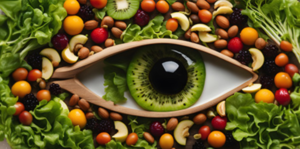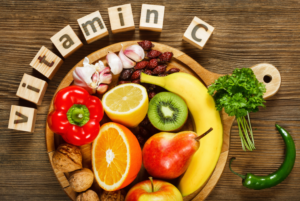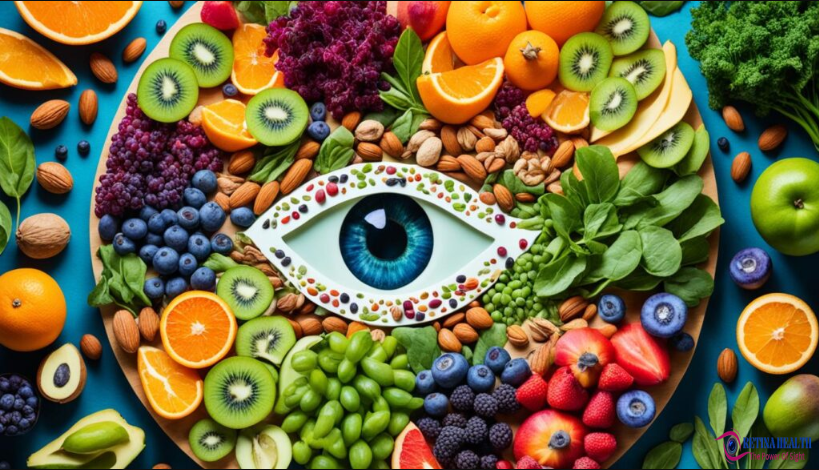Ocular Nutrients Essential For Eyes are important in maintaining and enhancing ocular health. Eye health is intimately connected with general health so nourishing your eyes with the right nutrients is fundamental to clear and healthy vision. Your daily diet and eating habits affect your eye health, some vitamins and minerals help the eyes maintain work properly, protect them from harmful things like direct sunlight, and overcome age-related diseases.
The Role of Nutrition in Eye Health:-
Nutrients play an important role in maintaining your whole body’s health and fitness role. The eyes are the most important organ in the human body. Essential vitamins, minerals, and antioxidants are key to keeping your eyes healthy. Various foods rich in nutrients can help you keep your eyesight good for a long time and also depend on the overall well-being of your eyes. Nutrients act like a shield against various challenges, helping your eyes stay strong and healthy every day, whether you get them from your food or take supplements.
When Your Vision is Clear, The Result Will Appear
Significance of Nutrition for Eye Health:-
The appropriate nutrients can keep you healthy and save your vision. A healthy lifestyle should include a healthy and balanced diet for a clean, clear, and bright vision throughout your life. Your eyes require a supply of essential nutrients to function properly. With the help of the right approach to nutrition, numerous minerals protect the eyes from damaging light while supporting eye health. Nutrition is so significant for eye health, protecting eyes from age-related diseases reduces the risk of other eye conditions and enhances the function of the eye. Some are mentioned here;
- Macular Degeneration: Macular degeneration is an eye disease that affects central vision. This means that people with macular degeneration can’t see things directly in front of them. This common age-related eye condition mostly occurs in people over the age of 50. Nutrients like lutein, zeaxanthin, and vitamins C and E can help to protect your eyes from this disease.
- Cataracts: Cataracts are cloudy areas that form on the lens of your eye. As you get older, the proteins in your lens break down, forming cloudy patches that affect your vision. You may feel as if you’re looking at the world through a dirty window. Over time, your vision gets worse. You may have a hard time carrying out routine tasks. Age-related cataracts is the most common form of the condition Antioxidants and vitamins can help to slow down the development and progression of cataracts.
- Dry Eye: Dry eye disease affects the layers of tears that cover your cornea. It happens when you don’t have enough tears or when your tears evaporate too quickly. Symptoms include burning, itching, and a gritty feeling in your eye. Omega-3 fatty acids can help you to improve tear production and reduce dryness and itching.
- Diabetic Retinopathy: Diabetes-related retinopathy is an eye disease that affects the retina. Anyone with diabetes can develop this condition. Without treatment, diabetes-related retinopathy can lead to vision loss or blindness. However, a balanced diet can help to manage blood sugar levels and reduce the risk of this disease.
Optimizing Your Diet for Eye Health:-
The connection between diet and eye health determines how well you see later in life. Our eyes may be small, but they are incredibly complex and intricate organs. Mechanisms in the front and back of the eye work in combination to allow you to see the world. Take a good and healthy diet because your diet can have a pretty significant effect on your vision over the years. Consistently choosing foods packed with eye-friendly nutrients can help prevent age-related macular degeneration, glaucoma, and other issues. Some of the best foods for promoting eye health include: Vitamin A, vitamin E, vitamin C, Zinc, Omega-3 fatty acids, Lutein and zeaxanthin, Beta-carotene, Selenium, and Anthocyanins.
Vitamin A:-
Vitamin A is an important nutrient that plays a crucial role in maintaining good vision. Vitamin A deficiency (VAD) is the single most important cause of childhood blindness in developing countries. According to a search Vitamin A deficiency affects approximately one-third of children aged under five around the world. An estimated 2.8 million preschool-age children are at risk of blindness from VAD, and the health and survival of 251 million others are seriously compromised. The potential health benefits of Vitamin A extend beyond just maintaining your vision in dim light. Vitamin A is a key component of rhodopsin, a protein in the retina that’s essential for seeing in low-light conditions. Vitamin A is considered a leading vitamin for vision and is readily available in a variety of food sources. Vitamin A is considered a leading vitamin for vision and is readily available in a variety of food sources. Severe vitamin A deficiency can lead to dryness, softening, and even ulceration of the cornea, which can significantly impact vision and night blindness, making it difficult to see in dim light or at night. Vitamin A helps keep the cornea moist and healthy and helps reduce the risk of age-related macular degeneration (AMD) and cataracts.
The potential health benefits of Vitamin A extend beyond just maintaining your vision in dim light. Vitamin A is a key component of rhodopsin, a protein in the retina that’s essential for seeing in low-light conditions. Vitamin A is considered a leading vitamin for vision and is readily available in a variety of food sources. Vitamin A is considered a leading vitamin for vision and is readily available in a variety of food sources. Severe vitamin A deficiency can lead to dryness, softening, and even ulceration of the cornea, which can significantly impact vision and night blindness, making it difficult to see in dim light or at night. Vitamin A helps keep the cornea moist and healthy and helps reduce the risk of age-related macular degeneration (AMD) and cataracts.
Food Sources of Vitamin A:
Vitamin A-rich sources include carrots, sweet potatoes, spinach, kale, and other leafy green vegetables. Carrots are rich in beta-carotene, a precursor to Vitamin A, which the body converts into the vitamin as needed. Just one medium carrot provides more than 200% of the daily value for Vitamin A, making carrots a powerhouse vitamin for vision. Sweet potatoes are another excellent source, with a single medium sweet potato furnishing more than 100% of the daily requirement. It is important in the prevention of night blindness and other eye maladies. Night blindness, an early symptom of Vitamin A deficiency, limits individuals’ ability to see in low-light or dark conditions. Beta-carotene is a plant pigment that your body converts into vitamin A. Some other sources are fish oil, eggs, and dairy products (fortified).
Vitamin C:-
Vitamin C, another vitamin for vision, is an essential nutrient known for its powerful antioxidant properties, playing a significant role in maintaining eye health. As an antioxidant Vitamin C helps to boost your immune system, protect the body’s cells from damage, and exacerbate the aging process, potentially leading to conditions like cataracts and macular degeneration. In the eye, Vitamin C is found in high concentrations in the aqueous humor of the eye, the fluid that fills the space in the front part of the eye enclosed by the cornea and the lens. Regular consumption of these fruits and vegetables not only supports the structural integrity of the cornea but also contributes to overall skin health and vitamin C, also known as ascorbic acid, is an important water-soluble vitamin. Vitamin C is available in many forms, but there is little scientific evidence that any one form is absorbed better or has more activity than another. Most experimental and clinical research uses ascorbic acid or sodium ascorbate. Natural and synthetic l-ascorbic acids are chemically identical, and there are no known differences in their biological activities or availability.
In the eye, Vitamin C is found in high concentrations in the aqueous humor of the eye, the fluid that fills the space in the front part of the eye enclosed by the cornea and the lens. Regular consumption of these fruits and vegetables not only supports the structural integrity of the cornea but also contributes to overall skin health and vitamin C, also known as ascorbic acid, is an important water-soluble vitamin. Vitamin C is available in many forms, but there is little scientific evidence that any one form is absorbed better or has more activity than another. Most experimental and clinical research uses ascorbic acid or sodium ascorbate. Natural and synthetic l-ascorbic acids are chemically identical, and there are no known differences in their biological activities or availability.
Food Resources Of Vitamin C:
Vitamin C is present in many foods in the form of citric acid like Oranges, lemons, limes, and grapefruits, it can boost your immune system. Another vitamin for vision, is Strawberries, blueberries, and raspberries, an essential nutrient known for its powerful antioxidant properties, playing a significant role in maintaining eye health. As an antioxidant, Vitamin C helps protect the body’s cells from damage caused by free radicals—molecules that can lead to oxidative stress and exacerbate the aging process, potentially leading to conditions like cataracts and macular degeneration. Kiwi, Guava, Bell peppers, Broccoli, and Spinach contain rich amounts of vitamin C. It may also be able to regenerate other antioxidants. It is required for the synthesis of collagen, an important structural component of blood vessels, tendons, ligaments, and bone. Vitamin C is also a highly effective antioxidant, protecting essential molecules in the body, such as proteins, lipids, carbohydrates, DNA, and RNA, from damage by free radicals and reactive oxygen species that can be generated during normal metabolism as well as through exposure to toxins and such pollutants as cigarette smoke. The eye has a particularly high metabolic rate and thus has an added need for antioxidant protection. Plasma concentrations of vitamin C, an indicator of intake, are related to levels in the eye tissue.


